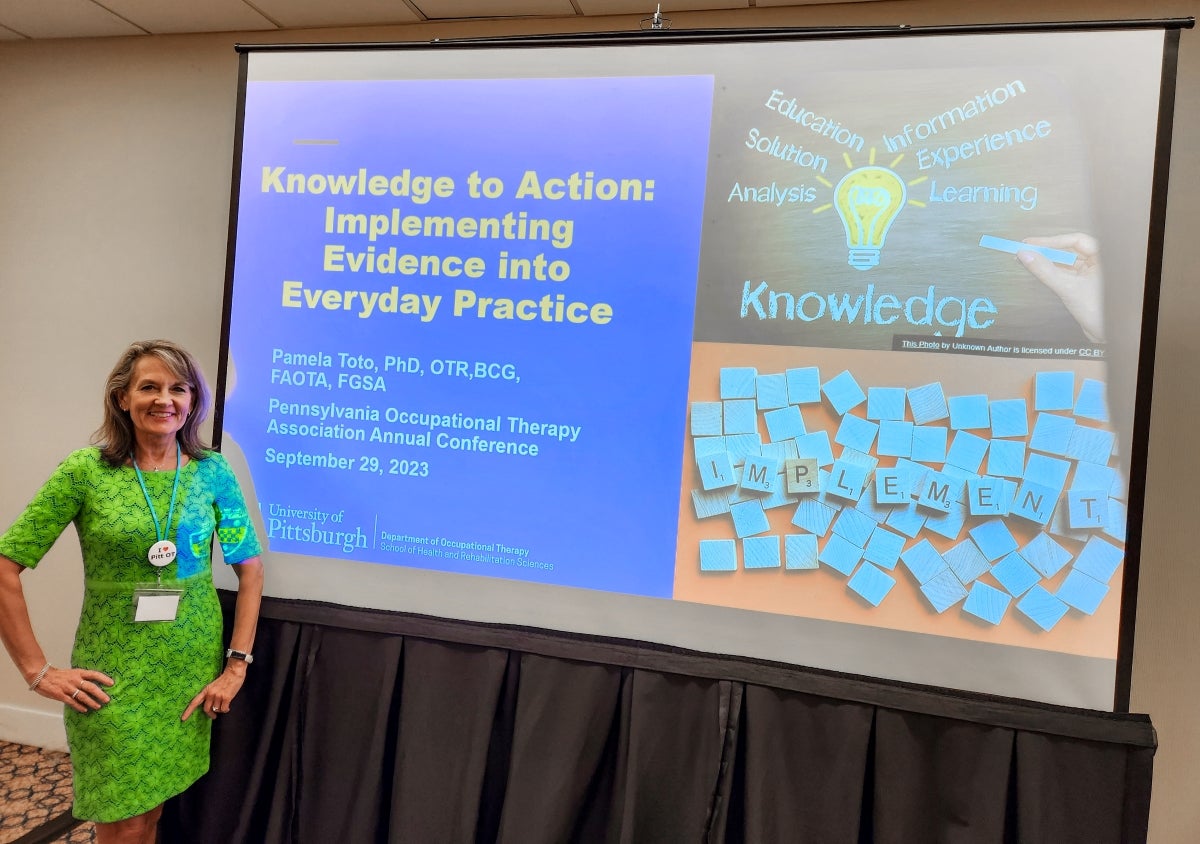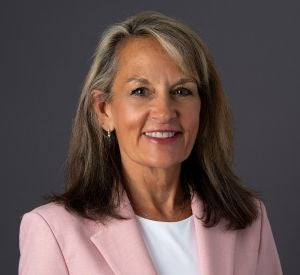Change comes from within. Its implementation doesn’t happen overnight and can be even more difficult in an environment as complex as the health care industry. Pamela Toto, however, is leading a new paradigm of change as director and professor of the University of Pittsburgh online post-professional Doctor of Clinical Science (CScD) in Occupational Therapy (OT) program. She and the Pitt Occupational Therapy faculty have designed the program to go beyond ordinary academics by empowering occupational therapists with the skills to implement change and transform their profession.
Bridging the Gap in Occupational Therapy
Today’s health care system carries significant challenges. When occupational therapists want to connect their clients to the best evidence-based therapies, they can face many barriers. Toto uses an example of what a school-based occupational therapist might encounter: The therapist attends a conference and learns new evidence that shows there is a better way to treat kids who have an attention deficit disorder or low sensory needs. It’s a new protocol or a new intervention and it’s been proven to work, but it costs money and time in order to implement it. Plus, it also requires change in the way teachers interact with the children and the structure of their school day.” When the occupational therapist tries to present their new ideas, they are met with administrative obstacles that leave them frustrated because they know how impactful the change could be for their students.
This specific example demonstrates what is common across the occupational therapy landscape. Multifaceted barriers must be overcome from within by “shifting our habits and routines in the way we provide services,” explains Toto.
Health care is a business and occupational therapists must anticipate the business outcomes of new proposed interventions.
“As occupational therapists, we’re trained to look at clinical outcomes. ‘Does my client become more independent?’ is a really important outcome, but when you’re looking at implementing something new, you have to also consider other types of outcomes. Workplace administrators have to consider the benefits of a new therapy, how to pay for implementing it, consumer response to the new innovation – all of which may make them hesitant to support changes.”
– Pamela Toto
Additionally, there can be geographic barriers if clients live in a rural area without easy access to facilities, or societal barriers if they have been conditioned to only seek health care once problems are so acute that they are admitted to an emergency room. According to Toto, in order to implement change, occupational therapists must become advocates of new methods to bridge the gap between evidence and workplace practice.

A One-of-a-Kind Program for Occupational Therapists
The solution to these barriers – effective strategies for implementing change – is being led by Pitt’s School of Health and Rehabilitation Sciences (SHRS) Department of Occupational Therapy. While there are other residential and online post-professional Doctor of Occupational Therapy programs across the U.S., the Doctor of Clinical Science in Occupational Therapy program at Pitt is one-of-a-kind. Toto explains that their curriculum focuses on knowledge translation and implementation: empowering occupational therapists to improve their skills in finding therapy evidence, using the tools proven by research, integrating that evidence into practice, and making an impact.
“Our program teaches students not just how to read a journal or research article, but how to interpret it with a clinical eye and then how to take the information, develop a plan and make it part of their practice. Our students apply and execute these new skills through the lens of their clinical or academic area of interest. These are not necessarily occupational therapist-specific skills, but they are critical skills needed across disciplines and especially in health care. Pitt is unique in offering such training in knowledge translation and implementation.”
– Pamela Toto
She continues, “Our program is making occupational therapy practitioners more effective: by finding evidence in their practice area of interest, understanding how to interpret it in practical ways, and then also looking at the business of translating that knowledge and implementing it into their practice and understanding the bigger parameters.”
Students in the CScD in Occupational Therapy program learn how to look beyond clinical outcomes, such as whether a patient is becoming more independent. They are learning to look at the business side of the health care system through service outcomes such as efficiency and sustainability, and knowledge translation outcomes such as reach and adoption. Toto says, “We’re teaching them how to move beyond clinical benefits and look at other outcomes. Students learn to speak the language of administrators to effectively demonstrate the value of the clinical change.”

A Curriculum Designed for Implementing Change from Within
The Pitt CScD program began as a full-time, residential program in 2015, but in 2019 Toto and other faculty saw the promise of developing an online program that maintained Pitt Occupational Therapy’s reputation while reaching more students beyond the Pittsburgh campus. They also sought to realign the program to the needs of clinicians who wanted to maintain their full-time jobs while working towards their doctoral degree in a part-time, online environment. To accommodate students’ schedules, the coursework is mostly asynchronous (done on your own time) with a weekly online component when classmates and professors meet together for 90 minutes to facilitate interaction and communication.
The CScD curriculum is project-based versus being heavily dependent on exams and finals. The heart of the program has students applying what they are learning in class to their jobs or area of interest for future practice. For their final capstone project, each student is encouraged to identify a project to improve their place of employment or to apply in a setting where they wish to work in the future. They use the skills learned in class to develop a solution that could potentially be implemented into their daily practice.
“We’ve built our curriculum so that our post-professional clinical doctorate is anchored on trying to help occupational therapists understand the dynamics of their profession better. They will become leaders not just in their own practice, but even on a bigger scale in their hospital systems, in their businesses and in rehabilitation departments. They will become better at understanding the barriers and addressing them.”
– Pamela Toto
The students in the CScD program are practicing occupational therapists from a variety of backgrounds in the U.S. and abroad who already have an entry-level degree in occupational therapy. Toto says, “We attract the type of student who is really hungry for the idea of being more effective in their practice. They know that they could be better clinicians or make a bigger impact, but they’re not sure how.” She continues, “They are all very passionate about advancing the occupational therapy profession. They want to make a difference in helping people and making sure they receive the best care. I think that’s a motivating factor in people who have entered our program.”

